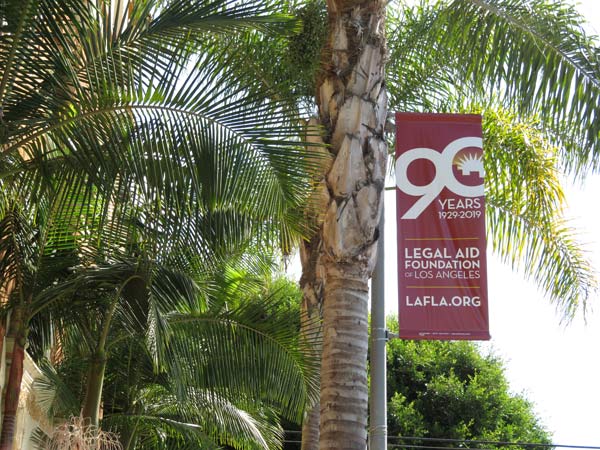 Juliette Ford, the author, is a paralegal with the Supporting Families Workgroup who co-runs LAFLA’s domestic violence hotline and legal clinic.
Juliette Ford, the author, is a paralegal with the Supporting Families Workgroup who co-runs LAFLA’s domestic violence hotline and legal clinic.
I have been working in domestic violence (DV) professionally for several years. When the need to share that fact presents itself, I always add “professionally.” Like many others in DV, my first encounter with intimate partner violence (IPV) was not the first day of a job.
We could call my early years “formidable research” for my current vocation. I grew up in a low-income housing apartment complex that was the world in my mind’s eye; the streets surrounding us, the universe. Every woman I knew, including my mom, experienced domestic violence. Domestic violence was pervasive.
The first advocates I knew were the ladies who sat in front of someone’s apartment door who knew everyone and provided support when things got to a crisis point. I still try and emulate them in my work every day.
My mom started a restraining order many times. In my current job at LAFLA, I think of her when I talk with clients about the abuse they suffered and the situations they’re facing. Regardless of whether the clients have left their abusive relationship, I feel it’s important for them to know that we see every attempt by them to leave as a victory worthy of honor.
For many years I believed that the restraining order we received (which I carried around in my backpack in elementary school) was the only thing that was keeping us alive. I am still certain that, had our abuser remained in our home another minute, one if not all of us would be dead. Now I understand that the restraining order didn’t save us, we did that. We do it every day still.
I experienced IPV as a teenager (also called “teen dating violence”). This experience gave me a greater understanding of my mother and the ways in which we (as victim-survivors) convince ourselves that we are the cause of the abuse, when in fact, it is the result of forces external to us.
I was always the friend called when one of my high school or college friends was in an abusive relationship. At every job I worked, people told me I had “the face” that they felt they could share everything with, which frequently included relationship abuse. I stumbled into my first DV job and after a week knew I would never work in anything but domestic violence for my entire working life. I have worked in shelters, case management, prevention education, and on many crisis hotlines. Only recently, with my job at LAFLA, have I overtaken my mom’s record for the number of restraining orders prepared for other people. She still does domestic violence work at a lay level. It is her and her unconquerable strength I think of during my work.
Even though we do not disclose our own histories, some clients can sense a shared understanding of a profoundly personal issue. Particularly during the pandemic, people can seek services from the privacy of their homes, behind locked doors, with their infants on their hips. We meet them where they are in such private spaces speaking about their heaviest fears. When we are bearing witness to the secrets they trust us with – so that we can prepare them for their next steps – I feel grateful to be in the position I have to receive that trust and to follow through on our commitments to our clients.
The work we get to do every day with our clients makes a difference not just to the individual client, but to their children, their families, their neighbors, and their community who see that someone they care about received help and that there is hope out in the world to be found.
Resources
If you are in immediate danger, please dial 911.
National Domestic Violence Hotline (shelter or other safety information) 800-799-7233, 800-787-3224 (TTY/TDD)
Los Angeles County Domestic Violence Hotline 800-798-3600
Click here for a list of emergency shelters.
Long Beach City Prosecutor 562-570-5600
LA County District Attorney, Long Beach Courthouse 562-247-2000
Long Beach Police Dept. Domestic Violence Unit 562-570-7277
Victim Witness Assistance Program 562-247-2068 or 800-380-3811
LAFLA resources:
We offer direct services to survivors of domestic violence, click here for more information. LAFLA also offers a new booklet on how to request a domestic violence restraining order; as well as self-help how-to guides that show you how to fill out many of the civil court forms for Los Angeles Superior Court.
Domestic violence agencies that provide counseling and case management:
1736 Family Crisis Center 213-745-6434, 213-222-1237, 310-370-5902, 310-379-3620, 562-388-7652
Center for the Pacific Asian Family 800-339-3940
East LA Women’s Center 800-585-6231
Haven House 424-293-2259
House of Ruth 877-988-5559
Interval House, Long Beach/Orange County 562-594-4555
Jenesse Center 800-479-7328
Jewish Family Services 877-275-4537
LGBT Center 323-993-7669
Peace Over Violence 626-793-3385, 310-392-8381, 213-626-3393
Rainbow Services, San Pedro, 310-547-9343
Su Casa, Long Beach and Lakewood, 562-402-4888
WomenShelter Long Beach, Long Beach, 562-437-4663
Support agencies:
For the Child, Long Beach 562-422-8472
Jewish Family & Children’s Service, Long Beach, West Orange County 562-427-7916
YWCA/Greater LA, Sexual Assault Crisis Program 877-943-5778
Batterers’ treatment programs:
Alternatives to Violence, Long Beach and West Los Angeles, 562-493-1161
Options Counseling, Long Beach and El Segundo, 562-989-0809
Tarzana Treatment Center, Long Beach, Lancaster, San Fernando Valley, 562-218-4111 x 7100
Hotlines:
LA County Child Abuse Hotline 800-540-4000
LA County Domestic Violence Hotline 800-978-3600
Sexual Assault Hotline 800-656-4673
Suicide Crisis Line 877-727-4747
Animal Protection Services 800-540-7722

